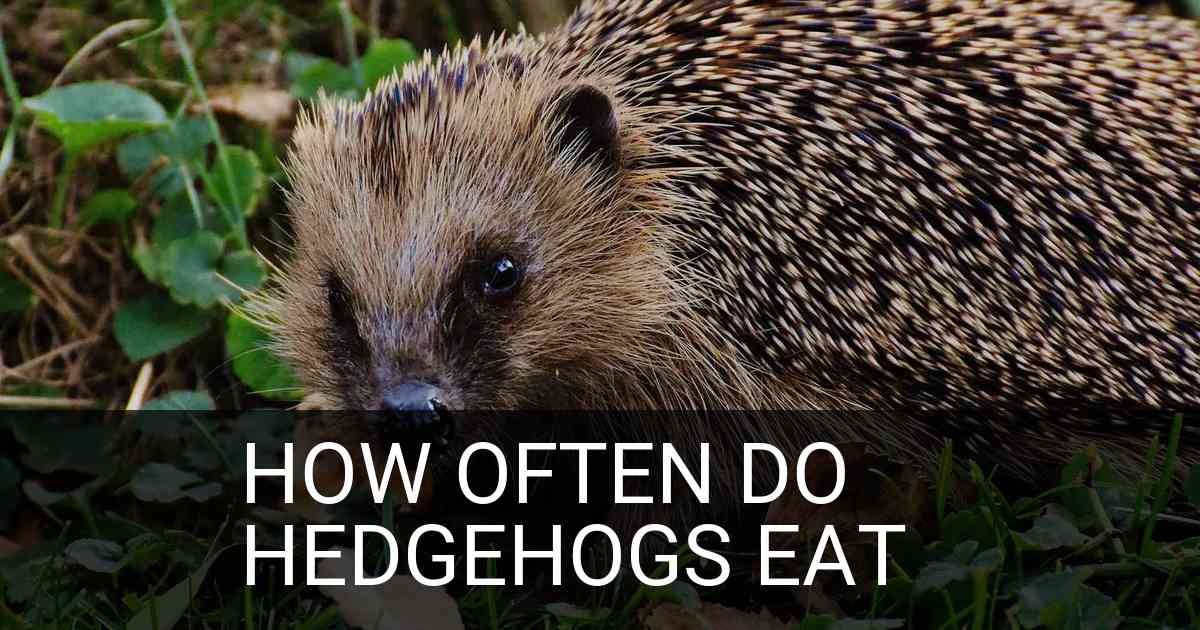
Hedgehogs are small, spiky animals that have long been admired for their unique and adorable appearances. Often kept as pets, hedgehogs can make wonderful companions – but they do require specific care to remain healthy and happy. One of the key aspects of caring for a pet hedgehog is understanding how often to feed them.
In this article, we will discuss the best practices for feeding your hedgehog in order to keep it well maintained and healthy. We will also provide tips on what type of food should be given and how much should be offered at each mealtime. So read on to learn more about how often you should feed your beloved pet hedgehog!
How Often Do Hedgehogs Eat?
Hedgehogs should be fed once a day, usually in the evening. A typical adult hedgehog will need 1-3 tablespoons of food per day. For younger or smaller hedgehogs, feed them every other day instead to ensure they are getting enough nutrition.
Tips for Feeding Your Hedgehog:
- Be sure to provide fresh water daily.
- Provide high-quality cat or ferret kibble as their primary diet.
- Supplement with small amounts of vegetables and fruits such as apples, strawberries, and carrots.
- Avoid giving sugary snacks like cookies or candy to your hedgehog.
Understanding Hedgehog Dietary Requirements
Hedgehogs are omnivorous and their diet includes both animal and plant material. They have specific dietary requirements in order to stay healthy and thrive, so it’s important to understand what they need.
Protein
Protein is a key component of the hedgehog diet as it helps them grow and maintain muscle mass. A good source of protein for hedgehogs is mealworms, crickets, waxworms or other small insects. You can also feed your pet hedgehog canned cat food or commercial dry hedgehog food, which usually contains fish meal or poultry meal as its main ingredient.
Fruits & Vegetables
Fresh fruits and vegetables should make up about 25% of a hedgehog’s diet. Fruits such as apples, peaches, grapes, blueberries and strawberries are great additions to the diet. Vegetables like broccoli, kale, zucchini and carrots are all suitable options too. It’s recommended that you offer your pet fresh foods daily.
Fat & Calcium
It’s important that your hedgehog has access to fat in their diet in order to keep their coat looking glossy. High-quality commercial dry kibbles contain a sufficient amount of fat but you can also supplement with sunflower seeds or other unsalted nuts if desired. Calcium is another important nutrient for hedgehogs; this can be provided by feeding eggshell powder (1/8 teaspoon per day).
What Do Hedgehogs Eat at Night?
Hedgehogs are largely nocturnal animals, meaning they come out primarily at night to feed. Hedgehogs have a varied diet which includes:
- Insects: Crickets, mealworms and beetles.
- Fruits & Vegetables: Apples, carrots, pears and other soft fruits.
- Meat: Cooked chicken, beef or pork.
Nutrition for Pet Hedgehogs
It’s important to remember that pet hedgehog nutrition is different than wild ones since their diets lack variety. To ensure a healthy and balanced diet for your pet hedgehog you should provide them with quality commercial foods designed specifically for hedgehog nutrition as well as fresh vegetables and fruits. Additionally, supplementing the daily meals with live insects like crickets or mealworms can be beneficial.
The Frequency of Hedgehog Feeding
Hedgehogs are omnivorous animals that need a balanced diet to stay healthy. A properly fed hedgehog can live up to 6-7 years in captivity, while wild hedgehogs usually only live 3-4 years.
How Often Should You Feed Your Hedgehog?
It is recommended to feed your hedgehog twice per day with an appropriate amount of food. It’s best to give them their meals at the same time each day so they get used to it and expect it. The amount you feed depends on the size and age of the animal, but generally speaking, one teaspoonful (or 5 grams) for every 100g of body weight is adequate.
What Foods Can You Give To Hedgehogs?
Hedgehogs should have a variety of foods in their diet including:
- Protein: Insects like mealworms or crickets are high in protein and essential for providing energy.
- Fruits & Vegetables: Fresh vegetables like broccoli, bell peppers, kale and carrots provide important vitamins, minerals and antioxidants as well as fiber.
- Grains: Cooked grains such as oatmeal contain carbohydrates which provide energy.
You should always avoid feeding your hedgehog processed foods such as candy or chips as these can be very unhealthy for them. Additionally, you should never feed them chocolate since this can be toxic!
Conclusion
In conclusion, hedgehogs need to be provided with a diet that contains the right balance of proteins, fats and carbohydrates in order for them to stay healthy. They usually require more frequent meals than other animals, but the exact frequency can vary depending on individual needs. To ensure your pet is getting the nutrients it needs, talk to a veterinarian or experienced breeder who will be able to give you more specific advice about your particular hedgehog’s dietary requirements.

